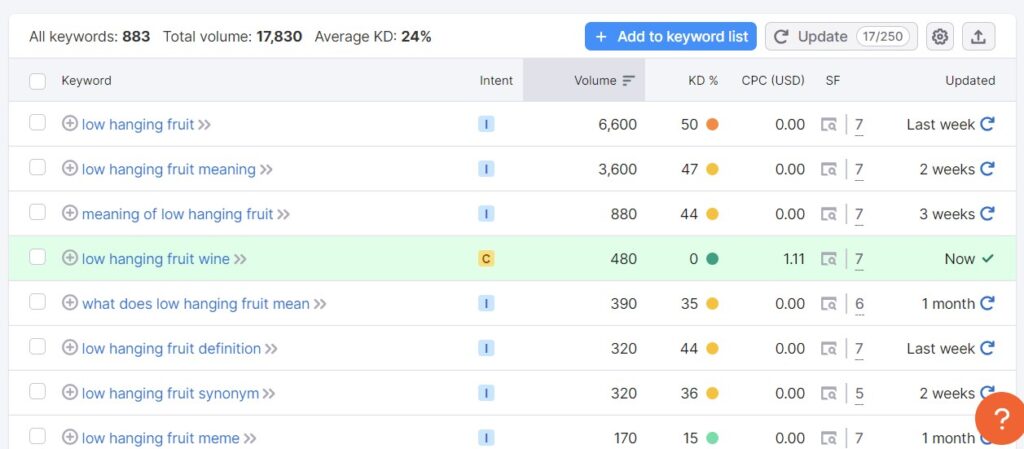One of the most challenging phases of Content Marketing is winning the SEO battle. That’s because of two main reasons:
- It’s constantly changing
- It’s responsible for up to 53% of all website traffic that comes from organic search. That is up 2% from 2019.
Notably, just this past month, we’ve had several Google updates that some called the “helpful content” update. As marketers are still trying to deal with it, the next update is always on the way.
As a matter of fact, a huge portion of useful website traffic comes from search engines. And the engines are making things tough, not because of themselves though.
It’s simply because search engine users (searchers) have become so demanding.
Searchers expect a lot from search engines. Patterns rapidly move from a single search term to search phrases. And most often, they are still not satisfied with the results.
Oftentimes, that’s why you hear of pogo-sticking. People click from SERP to a website and then back to SERP almost immediately, telling the search engine hey guy you didn’t understand my request. This isn’t what I want!
So here are some ways you can win the SEO battle today.
Table of Contents
Win The SEO Battle As Google Has Eyes On SERPs – Click-Through Rates
Some searchers will simply ignore entries on position #1 on SERP and sometimes click to page #2 where they find what they want.
In this case, the search engine is feeling so disappointed. What it thought was the most accurate information (listed on SERP #1) has been rejected by the searcher who is clicking to deeper pages, still trying (this time by luck) to find what he wants.
Poor Click Through Rates (CTR) of entries on search result page #1 is a direct message to the ranking system, telling it what’s listed on top of the page is not what I expect to get with this keyword.
Therefore, the search intent has been misunderstood and you won’t win the SEO battle.

From Short to Long Tail
What does someone want by simply typing “SEO” in the search box? It’s vague right? Does that short keyword mean anything specific?
What about “Best SEO books” ? Longer keyword right?
Does the searcher want to buy SEO books or maybe he’s someone looking for information on SEO books?
So you see searchers are difficult to understand. Or maybe it’s the choice of keywords that makes the whole thing complex.
In trying to satisfy searchers who are constantly relying on search engines for accuracy, search engines are becoming so unpredictable.
The SEO Battle Is On
Now, we have the searcher who wants some exact information. And you as a content marketer have succeeded in putting up something that meets the intent of the searcher.
The struggle is to get the search engine to understand the search intents, correctly match it with your content and consequently show your entry to the searcher on position #1, page #1.
It’s a serious SEO battle (not a war). But how do you overcome it to win SEO?
- Get the keyword of the searcher (Keyword research)
- Understand the keyword intent and develop content to accurately answer the search
- Help Google understand you have the best answer.
Recommended: 4 Most Effective Ways to Increase Your Website’s Search Traffic In 2019
1 – It Begins With Keyword Research To Win The SEO Battle
This is undeniably a crucial phase in any successful SEO marketing campaign. There is no possibility for a visitor to locate you from a search engine without the use of keywords.
I have read folks say Just flow. Write for your readers and search engines will find you. That sounds serene. But equally important, if you want to succeed in this game, pay attention to keyword research.
There is a big difference between Content Marketing (Which is using content to market your business), Search Engine Marketing (Which is using Search Engines to market your business) and, Social Media Marketing (Which is making use of Social Media to promote your business).
In Content Marketing, you drive traffic from all available channels, including SEO and Social media. In Social Media Marketing, you use platforms like Facebook, Twitter, Instagram, LinkedIn, etc, or outsource to Social Media Agencies.
As well as in Search Marketing, you also focus on traffic from search engines. Here my friend, keyword research is the foundation.
But this is as complex as it determines how successful your strategy will go. Keyword research has many different phases:
- Finding the keyword.
- Determining the monthly search volume.
- Keyword periodicity (smiles. I never heard this before).
- Analysing ranking difficulty.
- Analysing Competition and competitor strength.
Factor all these points and come up with a decision on whether or not to create content on the keyword.
Recommended: 5 Evergreen SEO Tips to Drive An Avalanche of There is no possibility for a visitor to locate you from search engine without the use of keywords.Search Engine Traffic to Your Websites
2 – Keyword Intent and Content
Trust me this will soon become the core of SEO marketing. People can manipulate backlinks and have other ranking factors work for them.
But if the intent is missing from the content, you will soon be kicked out of page #1.
Let’s consider a searcher who types “best hotels in Chicago” in the search box. What is he looking for exactly? You have to really go in-depth to touch the intent of such a searcher.
But presenting Hotel X as the best hotel, perhaps based on your personal experience could be completely wrong. No matter how in-depth your article on Hotel X is, Google will still be wrong if it ranks it on page #1.
Keyword Search For SEO Battle
The reason is that the keyword is nuanced as the searcher isn’t specific in any way. But the main question is: However, What does the searcher mean by BEST?
- Is it food quality or variety
- Or, is it the hotel site location
- Is it customer service
- Could it be the Price
- Is it security
- Or is it facilities
- Etc
Look, no one knows what’s the exact intent of this keyword. But if you do an in-depth article on “Top 10 hotels in Chicago”, highlighting all these areas, and answering all these questions, you could be classed very near the query intent.
Semantic SEO Helps a Lot
Moreover, semantic optimization is the new keyword optimization. Rather than optimizing and writing around the keyword “top 10 hotels in Chicago”, Semantic SEO will require you to optimize for the topic you are writing about, which is Hotels in Chicago.
This is a broad topic that should not be limited to a list of 10 hotels. Touching on some key points in the hospitality industry in Chicago will add more relevance to your content.
Likewise, using a well-developed Semantic SEO tool, you will be pleasantly surprised with the list of topically relevant keywords available to optimize and rank great.
3 – Helping Google Understand You Have The Best Answer
Now, this begins with a shift from keyword to topical focus. As mentioned in the point above, use a Semantic approach to let Google and other search engines know you have expertise in the industry.
Indeed, it doesn’t end at this point.
Search engines have different value signals they listen to, to determine the value of your content. They may think you’ve semantically created a great piece of content. But are readers reacting positively to it?
Are you getting links from high authority relevant domains? Linking to a blog post is like telling search engines ok I cast a vote in favor of this. I like it. What about your affiliate products?
The more backlinks from other websites with clean SEO profiles, the more the chances to have improved search rankings.
Adding to this, if readers show love for your content by dwelling more on it, dropping comments, sharing on social media, etc, these all send positive value signals to search engines.
Maintain Your Position On SERP To Win SEO Battle
It’s one thing to move to page 1 and it’s another to maintain the leadership position. Every single minute, someone is doing competitor research, looking for ways to push you away and occupy that hot spot.
For that reason, you must be strong to maintain and improve your position. Therefore, here are my suggestions:
- Constantly promote and build links to the post that ranks well
- Update more frequently, adding more fresh and relevant materials.
- Reposting gives it renewed energy through new comments and social shares from readers.
- Create related content and link to it internally
- Watch and disavow low-quality, spammy backlinks
Want To build Links To Win SEO?
Link building is a jaw-breaking SEO activity. At the same time, we need those links to boost ranking and traffic.
In this post on Ryan’s blog, I discussed how I build my links. But a dangerous link-building exercise I see today is outsourcing to link-building and guest posting services randomly picked online.
Therefore, I recently did some surface research and came up with a list of guest posting services for SEO link building.
During this period, I spoke with my friend Sunil Gupta, the guy managing Trafficora and my simple conclusion is you should deal with reputable SEO consultants and avoid being overwhelmed by scams in the industry.
Now, build links by submitting guest posts on sites with clean SEO profiles. You may hire someone to create your content. But pay keen attention to domains that link back to your site.
Furthermore, Jyoti Chauhan posted a guest post on my blog about buying backlinks. This is a quick and dangerous way to build links. If you want those toxic links to ruin your SEO campaigns, go buy from Fiverr.
Make It Easy To Rank
If you want to rank easily on any search engine to win SEO, your best friend is low competition. We all have just 10 spots on Google page 1 (For instance). The more the struggle for it, the tougher the fight.
When it comes to analyzing the competition for a given keyword, there are two matrices you should use to measure the level of resistance:
- The number of competitors
- The strength of competitors on page 1
Sometimes you may have just a few competitors who have a strong grip on Position #1 by way of their Domain Authority, Domain Age, and strong backlink references. As a result, think twice before competing against them.

On the other hand, if you have very weak competitors, no matter their numbers, go for it and chase them away.
Hence, use industry tools like SEMrush, Ahref, etc for your SEO Marketing Campaigns. Consequently, it may be difficult to succeed without these tools.
Conclusion: Win SEO
I hope this has been a good piece of info to help your search marketing and helps you to win the SEO battle.
Finally, let me know what you think in the comment box below, and don’t forget to share this post with others on social media.
- 5 Tips to Start and Run a Successful Online Business in 2025 - December 19, 2024
- How To Win SEO Battles And Constantly Be On Top Of SERPs - July 15, 2024
- How to Earn Free Bitcoin by Shopping Online with Lolli - February 11, 2024





The best way to win the SEO battle is to think big, and start small. Target low competition keywords, establish yourself with your first rankings; get some links and then continue by targeting progressively harder keywords.
Sounds so simple, but it ain’t:)
Hi Nikola, I like that ‘think big and start small” You are right that it is NOT simple with so much competition today out there in SEO. Thanks for your input and for coming by on this one. Have a great day!
Very well written article. I truly appreciate your thoughts. I would also like to share a few things on SEO. Being an inexpensive way of marketing SEO is what all businesses are aiming for. But at the same time, a lot of activities and time is invested in it. Hence, the right SEO knowledge is necessary to perform the SEO tasks efficiently so the desired results are achieved faster.
Enstine: Have you found an alternative to KW Finder? By the way: I like the cartoon with the long-tailed fox!
It’s a great article.
I want to ask you, how do we maintain our website rank so that it stays on page 1 of Google, because the website that I optimizing for is always changing pages. I am waiting for your answer, hopefully you can help me, thanks for sharing
You have to keep up with it Pack and keep your website fresh and with quality content as well as building links. Refresh old posts and be sure to interlink them too along the way. It’s a job that is NEVER done! Good luck.
Recently had an article featured in the snippet but was easily ranked out but it is really a constant battle for being a featured snippet
Hi Enstine & Lisa,
The constant changes in search engine algorithm makes SEO seems complex, but with long-tail keywords you can rank your blog perfectly well. Long-tail can help even a new blog to rank as long as you did your search, which is why performing keyword research is vital before applying your keywords to your content. However, your search must include keyword volume, and difficulty to be sure you will rank well.
You also need to know how to apply keyword intent, that is knowing what keywords your audience would be searching for. This activity will further help you rank better on Google. I would also add that, creating content cluster is one of the best ways to deal with SEO and win the battle, because it involves different topics under one umbrella, so-to-speak, with various keyword terms. This step is a rank booster.
Thank you for sharing this amazing piece!
Hey man,
Good to see you here and thanks for the comment.
I will be covering content cluster in the few days ahead on my blog. Add that to semantic SEO and a good auditing report, your blog will rock in SEO.
Excellent article. Thanks for the shout-out bro. I ranked for three of my prior articles this past week after paying attention to the details and writing an in-depth article. SEO is kind of easy if you follow the steps diligently.
thank you so much for the shout-out buddy. It is amazing that over the past week I ranked for 4 articles with semi-competitive keywords. SEO is pretty easy if you pay attention to the details and write a nice beefy article that meets the needs of your readers. Fabulous advice.
That’s the point, man.
Pay attention to the details and care about the readers not search engines. That’s where it is.
Superb Article Ever. Informative post.Thanks for providing the best information. This article definitely helps out to new startups like- mobile app development companies, web application development companies, and new bloggers also.
Thanks for the comment Ramjee.
I hope the new week is kicking in great.